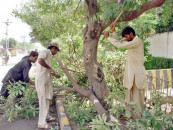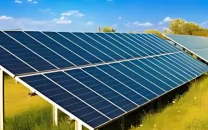Karachi's floating wetlands: University students innovate for water quality and climate resilience
Latest venture in Karachi installs floating wetlands in Korangi River.
1727084546-0/Untitled-design-(5)1727084546-0-640x480.webp)
In Karachi, where rapid urbanisation meets environmental challenges, a new initiative aims to transform the city’s water management and climate adaptation approach.
The Student Society for Climate Change Awareness (SSCCA) shortlisted four students from the Institute of Business Administration (IBA) — Nazish Abro, Areesha Aslam, Amna Lakha, and Aleezeh Ali Hafiz Azmat, known as PK Team 22.
After consulting with climate experts, they plan to install floating wetlands in Karachi’s rivers to highlight the severe pollution in the Korangi and Lyari Rivers.
The project involves creating floating wetlands from recycled bamboo jute foam, addressing water pollution, urban flooding, and rising temperatures.
This initiative combines sustainability, environmental justice, and community engagement, potentially serving as a model for other urban areas facing similar issues.
Syed Ahmed Kumail Tirmizi, SSCCA program coordinator, praised the team's dedication to tackling the water crisis, highlighting the innovative nature of their approach amid persistent challenges.
The Student Society for Climate Change Awareness (SSCCA) is focused on fostering climate responsibility and accountability among youth across South Asia.
Karachi, with a population of 20.3 million, faces significant strain on groundwater and river pollution.
The city discharges 362 million gallons of untreated sewage daily into the Malir and Lyari Rivers, which eventually flow into coastal creeks.
A 2021 study by the Pakistan Council of Research in Water Resources (PCRWR) found that over 80% of Karachi’s river water is contaminated beyond safe limits for human consumption and aquatic life.
“The extent of pollution in Karachi’s rivers and drains poses a significant obstacle, as it may overwhelm the capacity of floating wetlands to effectively purify water. Furthermore, the long-term maintenance of these systems, their scalability, and the assurance of consistent institutional support are paramount considerations that cannot be overlooked. Without robust governance, adequate funding, and active community involvement, the sustainability and expansion of these wetlands across the city may remain elusive, ” Muhammad Toheed, Urban Planner and Geographer.
Additionally, Karachi experiences frequent urban flooding, with severe floods in 2020 resulting in significant water accumulation and prolonged submersion in affected areas.



















COMMENTS
Comments are moderated and generally will be posted if they are on-topic and not abusive.
For more information, please see our Comments FAQ